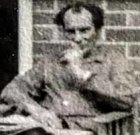
Carry on England Page #8
- NOT RATED
- Year:
- 1976
- 89 min
- 320 Views
Go on, Tiger. It's your birthday!
- I love you.
- You can tell him that as well.
All right.
Parade... stand at ease!
Stand easy.
Now, I am sure that you is all dying to know
the state of your commanding officer.
And I is very happy to inform you
that apart from a cracked funny bone,
sustained in the recoil, and a couple of
sprained fingers from tugging the toggle,
he is in what might be described as rude health.
In fact, he is coming out here now
to congratulate you as you so richly deserves.
# And the same to you!
Hooray!
And so it came about that through
the blunderings of one poor bloody officer,
a certain person who shall be nameless
was able to create
an everlasting symbol of encouragement
and devotion to duty,
the entire world!
Translation
Translate and read this script in other languages:
Select another language:
- - Select -
- 简体中文 (Chinese - Simplified)
- 繁體中文 (Chinese - Traditional)
- Español (Spanish)
- Esperanto (Esperanto)
- 日本語 (Japanese)
- Português (Portuguese)
- Deutsch (German)
- العربية (Arabic)
- Français (French)
- Русский (Russian)
- ಕನ್ನಡ (Kannada)
- 한국어 (Korean)
- עברית (Hebrew)
- Gaeilge (Irish)
- Українська (Ukrainian)
- اردو (Urdu)
- Magyar (Hungarian)
- मानक हिन्दी (Hindi)
- Indonesia (Indonesian)
- Italiano (Italian)
- தமிழ் (Tamil)
- Türkçe (Turkish)
- తెలుగు (Telugu)
- ภาษาไทย (Thai)
- Tiếng Việt (Vietnamese)
- Čeština (Czech)
- Polski (Polish)
- Bahasa Indonesia (Indonesian)
- Românește (Romanian)
- Nederlands (Dutch)
- Ελληνικά (Greek)
- Latinum (Latin)
- Svenska (Swedish)
- Dansk (Danish)
- Suomi (Finnish)
- فارسی (Persian)
- ייִדיש (Yiddish)
- հայերեն (Armenian)
- Norsk (Norwegian)
- English (English)
Citation
Use the citation below to add this screenplay to your bibliography:
Style:MLAChicagoAPA
"Carry on England" Scripts.com. STANDS4 LLC, 2025. Web. 2 Feb. 2025. <https://www.scripts.com/script/carry_on_england_5120>.







Discuss this script with the community:
Report Comment
We're doing our best to make sure our content is useful, accurate and safe.
If by any chance you spot an inappropriate comment while navigating through our website please use this form to let us know, and we'll take care of it shortly.
Attachment
You need to be logged in to favorite.
Log In